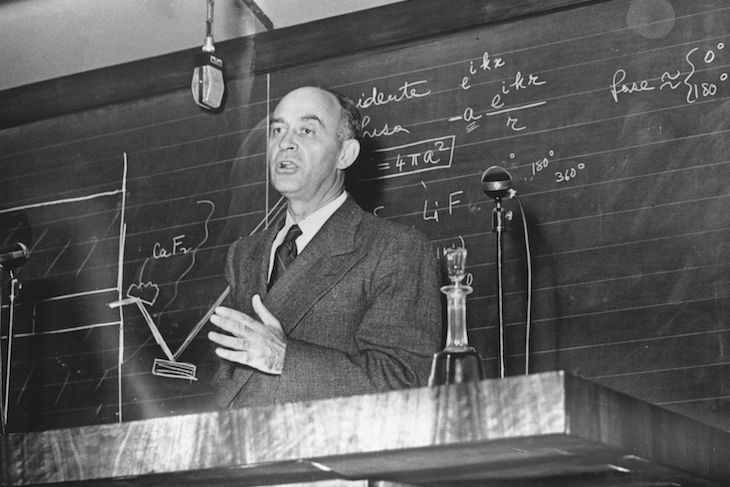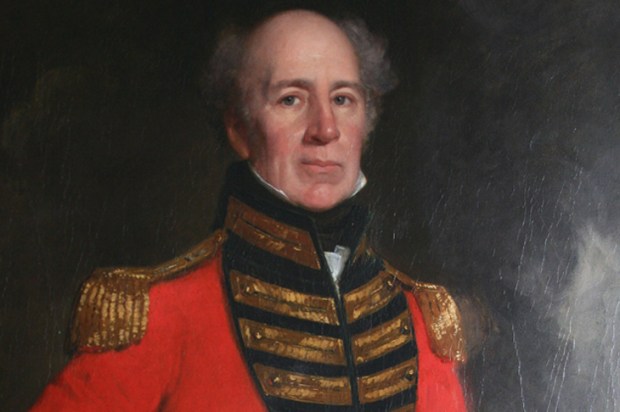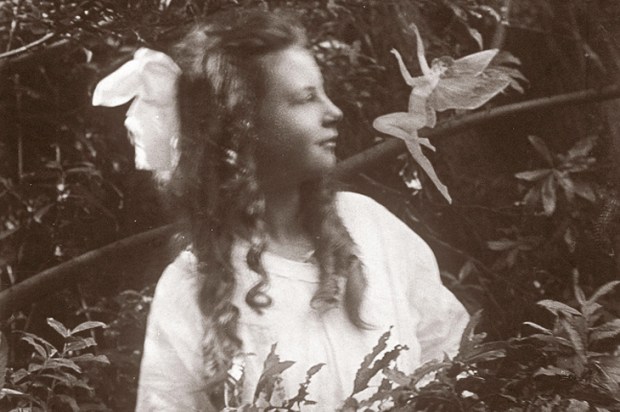Enrico Fermi may not be a name as familiar as Einstein, Feynman or Hawking, but he was one of the greatest figures of 20th-century physics, with a reputation for infallibility. In Rome, pioneering atomic science under Mussolini, he was nicknamed ‘the Pope’. Escaping to America where he created the world’s first nuclear reactor, he was dubbed ‘the last man who knew everything’. Yet he was no Renaissance man: he knew everything about physics, and didn’t care much about anything else. It is testimony to David N. Schwartz’s excellence as a biographer that he can reveal the workaholic Fermi to have been such a fascinatingly complex figure.
He was, we are told, a gifted teacher and natural leader. Fermi generously let younger colleagues publish joint work without his name, so that he would not overshadow them. His insistence on personally carrying radioactive samples for his team may have led to the stomach cancer that killed him in 1954 at the age of only 53. Few physicists get memorialised as he was, in a double album of recorded reminiscences by colleagues, To Fermi with Love.
Yet beneath the charm there may have been a troubled inner life. As a child, Fermi idolised his older and apparently more gifted brother, who died in his teens, causing their mother to retreat into incurable depression. Schwartz’s speculation that this random catastrophe helped inspire Fermi’s later interest in statistics seems far-fetched, but the event does give an insight into a recurring pattern, which Schwartz highlights.
As a student, Fermi became part of a group who engaged in childish, sometimes nasty pranks. His next gang consisted of the fellow researchers who called him ‘Pope’, and who themselves adopted ecclesiastical nicknames of lower rank. The American Manhattan Project was Fermi’s biggest and most powerful gang, though he seems to have harboured doubts about the enterprise, at times almost willing it to fail. After the attacks on Hiroshima and Nagasaki, Fermi’s sister, in Italy, told him how appalled she was by what he had done, writing bitterly: ‘I recommend you to God.’
Fermi had kept his atomic work completely secret from his wife Laura, who had been puzzled by an atmosphere of celebration after what in fact had been the first test detonation. Witnessing the blast, Fermi famously dropped scraps of paper in the wind and quickly calculated the power of the bomb. As Schwartz convincingly argues, this betrayed another aspect of Fermi’s character: his taste for showmanship. The apparently spontaneous paper experiment had been carefully considered beforehand, and the same probably applied to another legendary moment, when Fermi first directed his nuclear reactor to go critical, deciding at a crucial moment to halt proceedings for lunch. Everything, Schwartz suggests, was planned in advance, then performed for maximum effect.
This is not to detract from Fermi’s genius or the greatness of his achievements, but it does hint at an insecurity we might trace back to his traumatic childhood. His fondness for juvenile party games and playful teasing did amuse his friends, but Laura grew weary of it. Their son Giulio, named after Fermi’s dead brother, distanced himself from his famous father, preferring to be called Judd. Emotionally tormented as an adolescent, Judd attempted suicide.
One of the most troubling aspects of Fermi’s career is his apparent compliance with Mussolini’s regime. He became a member of the Fascist party in 1929, and it was not until 1938 that he and Laura emigrated to the United States. Fermi was considered ‘ultra-conservative’ by the FBI, but it seems fair to say that he was as little interested in politics as he was in most things outside physics. Schwartz maintains that Fermi wanted to emigrate far earlier, lured by attractive job offers, but his wife resisted. Her father, an admiral in the Italian navy, was Jewish, and it was only when Mussolini introduced new racial laws that she finally gave in.
But there may have been a further factor. Hitler had ordered German scientists to boycott the Nobel Prize. Mussolini was expected to follow suit; but Fermi’s discoveries made him a clear candidate. He was discreetly asked whether he would accept the prize — the only person ever to be pre-warned in this way. Emigration solved the issue: the Fermis stopped off in Stockholm, where Enrico collected his award alongside the literature laureate Pearl Buck.
The Last Man Who Knew Everything faces competition from another relatively recent biography of Fermi, The Pope of Physics, by Gino Segrè and Bettina Hoerlin, which is stronger on science,but more reticent on personal aspects. Schwartz gives an adequate account of technical details but excels in a portrayal that is balanced and nuanced, sympathetic but unflinching.
Fermi’s name endures in the massive Fermilab accelerator in Illinois, and the fermions that collide inside it. Like those eponymous particles, Fermi was energetic, elusive, and in the end perhaps unfathomable.
Got something to add? Join the discussion and comment below.
Get 10 issues for just $10
Subscribe to The Spectator Australia today for the next 10 magazine issues, plus full online access, for just $10.
You might disagree with half of it, but you’ll enjoy reading all of it. Try your first month for free, then just $2 a week for the remainder of your first year.














Comments
Don't miss out
Join the conversation with other Spectator Australia readers. Subscribe to leave a comment.
SUBSCRIBEAlready a subscriber? Log in